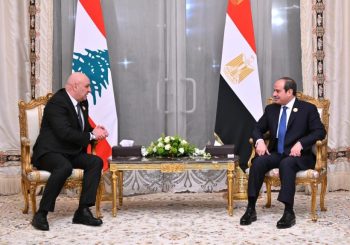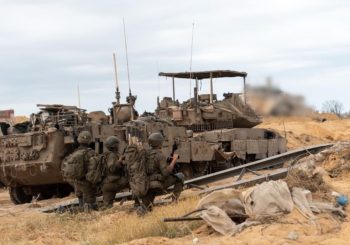The October War, known in Israel as the Yom Kippur War, is remembered today as the final turning point in Egypt’s lasting conflict with Israel, thought of as one last punch to peace.
To Egyptians, it was a war of liberation, eventually ending in the country’s retrieval of Sinai, which was occupied by Israel since the 1967 War. To Israelis, it was their darkest and most traumatic event, and the first time the nation truly feared the possibility of an Arab invasion.
To historians and political officials of the era, it was one step away from being a nuclear crisis.
On 7 October 1973, Israel’s Defense Minister, Moshe Dayan, called upon Shalhevet Freier, Israel’s director-general of its Atomic Energy Commission, to a meeting with Prime Minister Golda Meir regarding the current status of the war.
Dayan dejectedly announced the impending demise of the ‘Third Temple’, a Hebrew reference to the modern state of Israel, after seeing significant Israeli losses on the front lines of the war.
By the time Dayan witnessed the war, both Egyptian and Syrian troops had advanced on Israeli-occupied territories, destroying multiple brigades, and causing a large number of casualties.
“I saw a young officer, he looked at me, and I couldn’t believe it, he said ‘we cannot stop them’,” recalled deceased former Israeli Prime Minister, Ariel Sharon, who was a general in the war at that time. “We lost [from] my division about 300, killed, and 1,000 wounded. It was the most terrible night I’ve ever seen.”
Dayan, fearing the demise of Israel lobbied the idea of mobilizing nuclear warheads to Meir.
In Dayan’s eyes, if Tel Aviv was to fall, so should Cairo and Damascus.
Arnan Azaryahu, a Senior Aide to Yisrael Galili, a minister and advisor to Meir during that time, witnessed the moment Dayan dropped his nuclear suggestion to the shocked group of politicians.
Interviewed by Israeli historian, Avner Cohen, Azaryahu recalls the moment with great detail.
“[Galili] got a call to stop by Meir’s office for five minutes. He entered and I stayed in the corridor,” explains Azaryahu.
The five minutes would soon become ten, then twenty, and then thirty. Galili eventually stepped out of the room after forty-five minutes, looking overwhelmed. Galili immediately tells Azaryahu that he had never experienced anything like that, mentioning the topic was Syria’s unstoppable advancements towards the Golan Heights.
Also in that meeting were Deputy Prime Minister Yigal Alon, Chief of Staff David Eliezer, and Dayan.
Dayan’s atomic announcement came shortly after Galili exited the room, recalled Azaryahu.
“I forgot something, I thought since the situation was so bad, as explained for half an hour [by Eliezer], that we should prepare for a demonstration of a nuclear option,” Dayan stated according to Azaryahu’s memory.
“Alon and Galili stood up to vehemently oppose the idea […] Meir, after hearing them, told Dayan to ‘forget it’,” opting to proceed with conventional methods instead.
Nevertheless, the idea behind a nuclear last resort lingered in the minds of Israel’s leaders – an idea that alarmed the United States, who feared a nuclear response would be met with Soviet retaliation.
Meir, instead, exploited the possible nuclear cloud that loomed over the war as a means to extort weaponry from the United States on 8 October, in an intelligence report by Israel’s ambassador to Secretary of State Henry Kissinger.
The United States had previously rejected sending support to Israel during the war but now agreed to aiding the losing state in hopes of subduing its nuclear aspirations.
The additional state-of-the-art equipment given to Israel, inspired by its nuclear display, balanced the tides of war, helping Israel come back from a seeming defeat, and eventually ending the war with a cease-fire on 25 October.
The end result remains as it is today. Egypt was victorious in recapturing its lands. Peace came in the following years, in the form of the Camp David Accords.
The threat of nuclear destruction now exists as a footnote, but also as a horrific reminder that the war was one cabinet agreement away from happening.
Subscribe to the Egyptian Streets’ weekly newsletter! Catch up on the latest news, arts & culture headlines, exclusive features and more stories that matter, delivered straight to your inbox by clicking here.






Comments (0)